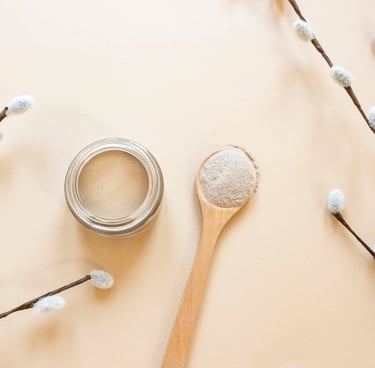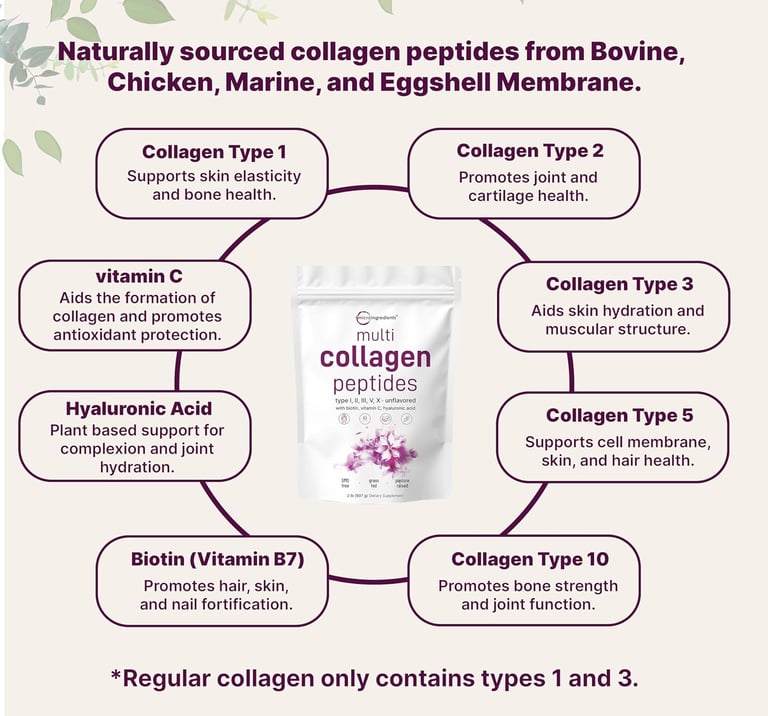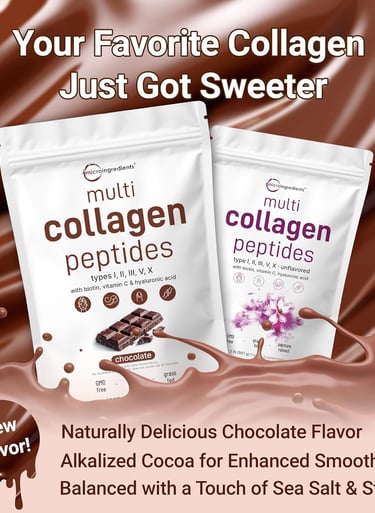Collagen: What It Is, Why It Matters, and How to Support It
Collagen has become one of the most talked-about wellness topics, and for good reason. From glowing skin to strong joints and bones, this powerful protein plays a central role in keeping your body healthy and resilient. But what exactly is collagen, and should you consider supplements? Let’s break it down.
9/25/20253 min read
What Is Collagen?
Collagen is the most abundant protein in the human body, making up about 30% of your total protein. Think of it as the glue that holds everything together. It’s a primary building block for your:
Skin
Muscles
Bones
Tendons and ligaments
Blood vessels and organs
Intestinal lining
Collagen is formed from amino acids (mainly glycine, proline, and hydroxyproline), which your body weaves into strong, rope-like fibers. Vitamin C, zinc, copper, and manganese are essential helpers in this process.
Types of Collagen
Scientists have identified 28 types of collagen, but five dominate in the body:
Type I – Makes up 90% of your collagen. Found in skin, bones, tendons, and ligaments.
Type II – Supports elastic cartilage in joints.
Type III – Found in muscles, arteries, and organs.
Type IV – Present in the layers of your skin.
Type V – Found in the eyes, skin layers, hair, and placenta.
Why Collagen Matters
Collagen’s main role is to provide structure, strength, and elasticity throughout your body. It helps:
Keep skin firm and hydrated
Support joint flexibility and cushioning
Strengthen bones and prevent fractures
Maintain strong muscles and connective tissues
Protect organs and support blood vessels
What Happens as We Age?
Unfortunately, collagen production naturally declines with age — and the quality of collagen decreases too.
By your 30s, production begins slowing down.
Women experience a steep drop after menopause.
By age 60, everyone sees a significant decline.
Signs of low collagen may include wrinkles, sagging skin, stiff joints, weaker muscles, digestive issues, and slower wound healing.
Lifestyle Habits That Damage Collagen
Certain lifestyle factors speed up collagen loss:
Smoking – Reduces collagen production and slows skin healing.
High sugar/refined carbs – Weaken collagen fibers, making them brittle.
Excess UV exposure – Breaks down collagen and accelerates skin aging.
Autoimmune diseases – Conditions like lupus or rheumatoid arthritis can damage collagen.
Can Food and Supplements Help?
Food Sources
Collagen itself can’t be absorbed whole from food, but eating the building blocks helps your body make more. Key nutrients and sources include:
Vitamin C: Citrus fruits, strawberries, bell peppers, broccoli
Proline: Egg whites, mushrooms, asparagus, peanuts, meat
Glycine: Poultry skin, pork, beef, granola
Copper: Nuts, seeds, shellfish, leafy greens, dark chocolate
Zinc: Meat, beans, whole grains, dairy
Animal foods like bone broth, chicken skin, pork skin, beef, and fish also naturally contain collagen.
Collagen Supplements
Most supplements are sold as hydrolyzed collagen (collagen peptides) — small, easily absorbed protein fragments. Research shows:
May improve skin elasticity and hydration
May support joint comfort in people with osteoarthritis
May help reduce bone loss in postmenopausal women
May boost muscle mass when combined with resistance training
Other claimed benefits — like gut health, brain health, or weight loss — are promising but not yet proven.
Are Collagen Supplements Safe?
Collagen supplements generally have a good safety profile. Some people report mild side effects like bloating or nausea. Those with allergies to fish, shellfish, or eggs should avoid supplements made from those sources.
A note of caution: The FDA does not regulate supplements the way it does medications. Always choose reputable brands with third-party testing.
Collagen and Healthy Aging
For older adults, collagen supplements may provide an extra boost:
Skin: Studies show doses of 2.5–10 g/day can improve hydration, elasticity, and smoothness.
Bones: Daily collagen (around 5 g) has been linked to increased bone mineral density in postmenopausal women.
Muscles: Combined with strength training, collagen may help maintain muscle mass and function.
Given their solid safety profile, supplements can be a useful tool, though they’re not essential for everyone.
The Bottom Line
Collagen is vital for skin, bones, joints, and overall health — but age, lifestyle, and environment all chip away at it.
Here’s how to support your collagen naturally:
Eat a nutrient-rich diet (lots of fruits, vegetables, protein, and whole foods).
Avoid smoking, excess sugar, and too much sun exposure.
Protect your skin daily with sunscreen.
Consider a collagen peptide supplement if you want added support for skin, joints, or bones.
Collagen isn’t a miracle cure, but with the right lifestyle habits, it can help you feel stronger, look healthier, and age more gracefully.






